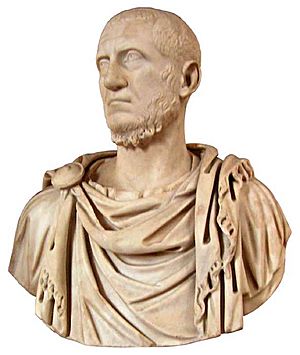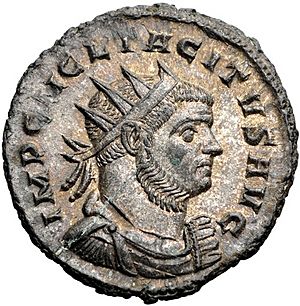Tacitus (emperor) facts for kids
Quick facts for kids Tacitus |
|||||||||
|---|---|---|---|---|---|---|---|---|---|
 |
|||||||||
| Roman emperor | |||||||||
| Reign | c. December 275 – c. June 276 | ||||||||
| Predecessor | Aurelian | ||||||||
| Successor | Florianus | ||||||||
| Died | June 276 Antoniana Colonia Tyana, Cappadocia (now Kemerhisar, Cappadocia, Turkey) |
||||||||
|
|||||||||
Marcus Claudius Tacitus was a Roman emperor who ruled for a short time, from 275 to 276 AD. During his reign, he led military campaigns against groups like the Goths and the Heruli. Because of his victories, he was given the special title Gothicus Maximus. This title meant "Greatest Goth-conqueror."
Contents
Early Life of Tacitus
Not much is known about Tacitus's early life. Some stories said he came from a very old and rich family in Umbria, a region in Italy. These stories also claimed he was one of the wealthiest people in the Roman Empire.
However, many historians today believe these stories were made up. It's more likely that Tacitus came from the Illyrian military. This means he was a soldier who rose through the ranks.
Tacitus held several important government jobs during his long life. He was a Roman consul (a high-ranking official) twice. He earned a lot of respect from everyone.
Becoming Emperor
After the previous emperor, Aurelian, was killed, the Roman army felt bad about it. They decided to let the Roman Senate (a powerful group of leaders) choose the next emperor. This was unusual, as the army often chose emperors themselves.
After a few weeks, the Senate offered the throne to Tacitus. He was an older, respected leader of the Senate at the time. He accepted the role in September 275 AD. The army then agreed with the Senate's choice.
Some historians believe Tacitus was the last emperor ever chosen by the Senate. Other accounts suggest the army actually chose him without the Senate's help. He likely became emperor in late November or early December.
Tacitus was living in Campania (a region in Italy) when he was chosen. He returned to Rome and immediately asked the Senate to declare Aurelian a god. He also arrested and punished those who had killed Aurelian. Ancient sources often described Tacitus as very old, but he was probably in his fifties.
One of Tacitus's main goals was to give more power back to the Senate. He gave them the right to choose the emperor and other important officials. He also gave them power over some parts of the empire's money. These changes were respected by the next emperor, Probus. However, these powers did not last long after Tacitus's reign.
Fighting Against Invaders
Tacitus then had to deal with barbarian groups. These were mercenaries (soldiers for hire) that Aurelian had gathered for a war in the East. When Aurelian was killed, the war was canceled. These mercenaries then started attacking towns in the eastern Roman provinces.
Tacitus and his half-brother, Florian, led the Roman forces. They won a big victory against these tribes, including the Heruli. This victory earned Tacitus the title Gothicus Maximus.
The Death of Tacitus
After his victories, Tacitus started heading back west. He planned to deal with new invasions by the Franks and Alamanni in Gaul.
However, Tacitus died in Tyana, a city in Cappadocia, around June 276 AD. He had ruled for just over six months. Most sources say he died of a fever. But some historians claim he was assassinated. This second story suggests he was killed after giving an important military job to one of his relatives in Syria.
See also
 In Spanish: Tácito (emperador) para niños
In Spanish: Tácito (emperador) para niños
 | Audre Lorde |
 | John Berry Meachum |
 | Ferdinand Lee Barnett |


